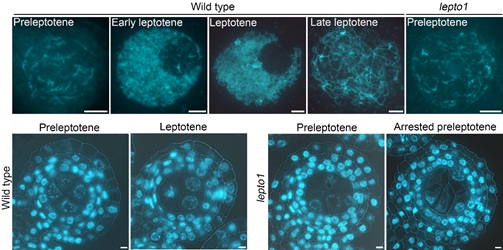Response regulators (RRs) participate in various biological processes which include growth, development, regeneration, and stress response. However, the roles of RRs in meiosis remain unclear.
Recently, the team led by Prof. CHENG Zhukuan from Institute of Genetics and Developmental Biology, Chinese Academy of Sciences, identified LEOTOTENE1 (LEPTO1) as a player participating in the organization of leptotene chromosome in rice meiosis.
The researchers found that lepto1 PMCs are arrested at preleptotene and meiotic chromosomes fail in processing to thread-like structures. Moreover, lepto1 PMCs have defects in double strand breaks (DSBs) formation, the recruitment of meiotic proteins and the deposition of callose.
Further analysis demonstrates that LEPTO1 encodes OsRR24, belonging to type-B response regulators (RRs). LEPTO1 has a conserved DDK domain and MYB domain at the N terminus, and the C terminus of LEPTO1 has transactivation activity, indicating LEPTO1 may act as a transcription factor to effect meiotic chromosome status via regulating the expression levels of related genes.
These findings revealed that LEPTO1 is essential for establishing leptotene status in rice meiosis, which proved that type-B RRs participated in the genetic regulation of meiosis initiation. This provides direct clues for exploring the functions of RRs in angiosperms.
The paper entitled “The OsRR24/LEPTO1 Type-B Response Regulator is Essential for the Organization of Leptotene Chromosomes in Rice Meiosis” was published in The Plant Cell on December 11, 2018 (
DOI:10.1105/tpc.18.00479).
Figure 1. Chromosomes of the wild type and lepto1 in rice. (Image by IGDB)
Contact:
Mr. QI Lei
Institute of Genetics and Developmental Biology, Chinese Academy of Sciences
Email: lqi@genetics.ac.cn
 Figure 1. Chromosomes of the wild type and lepto1 in rice. (Image by IGDB)Contact:Mr. QI LeiInstitute of Genetics and Developmental Biology, Chinese Academy of SciencesEmail: lqi@genetics.ac.cn
Figure 1. Chromosomes of the wild type and lepto1 in rice. (Image by IGDB)Contact:Mr. QI LeiInstitute of Genetics and Developmental Biology, Chinese Academy of SciencesEmail: lqi@genetics.ac.cn CAS
CAS
 中文
中文




.png)
